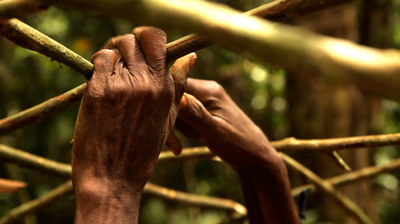The same filmmaker, Laurent Maget, made the documantary ‘Pygmées Baka, le grand virage’ in 2013. It starts with the same beautiful imagery, showing a large community of Baka in their more sedentary surroundings ‘Le Bosquet’ in Cameroun. They tell of how they got there, invited by a ‘sister’ (I presume a christian missionary) to come live there, next to a village, and create a large community. This worked, they got advantages like a school. The community attracted researchers (biologic anthropologists) who have in return a dentist pass by regularly. Then it also attracted Bantou shopkeepers.
From the 8th minute (of the 38′ film) on, the film focuses on the changing realities of the pygmies. We from then on we almost only see others speaking about the pygmies: the biologic anthropologists about gathering data, measuring the childrens’ growth rate (with some images reminding of the old physical anthropology measuring people for classification) and expressing themselves on the community, just like the local teacher and the Bantou shopkeeper. The pygmies are spoken of and shown in terms of measurement, as diseased, drunk, the children leaving school to hang around the shops with the music. We see the community ruined by alcohol. We listen to some Bantou people, again questioning the humanity of the pygmies in extremely racist terms.
Remarkably, also from then on (8′), the Baka are much more pictured from a high camera viewpoint.
A young Bantou shopkeeper had her friends and family laugh at her: “So now you are going to live back there with the smelling pygmies?” She had answered: “I am bettering myself, looking for my money, money does not smell”. After two years, they saw her doing well and said: “Ah, so the money of the Baka became clean? We will also come there.”
The person taking a stance is the anthropologist, saying that today’s problems are only a moment of passage, that the pygmies are adapting to their new world and that they will be alright in the end. A true believer in progress. ‘Nothing to do about the changing circumstances’, he seems to say, supported in the documentary by some maps of the future kobalt mines in the region. Those make it very clear that the forest will be cut up in small parts separated by roads. There are promises of jobs – but I hear not one guarantee that the jobs will go to the pygmies… if they would want them.
It is a very bitter conclusion, simply accepting the changing world. No talk of owners’ rights for the Baka, of preserving large pieces of forest. Nobody asking their opinion.. same thing all over again. So everybody is ‘bettering’ themselves, except the Baka who have to look deeper and deeper into the woods for game.
I do suspect this movie wants to be critical of all of this… but it is not explicit enough. It sounds as if it takes the stance of the biologic anthropologist who suggests that “the pygmies will be fine in the end”.
